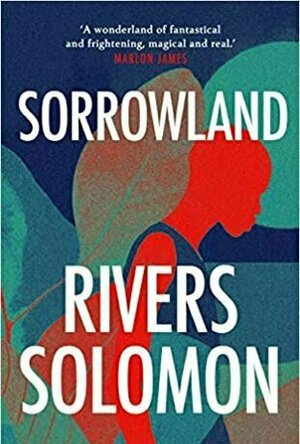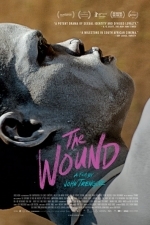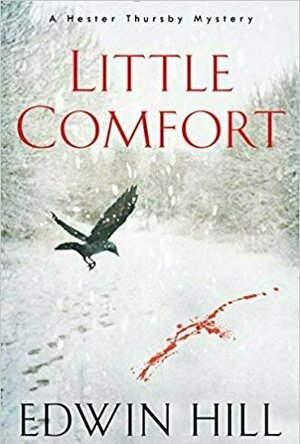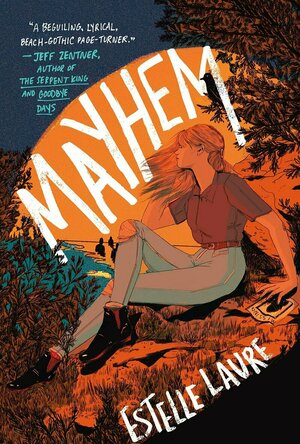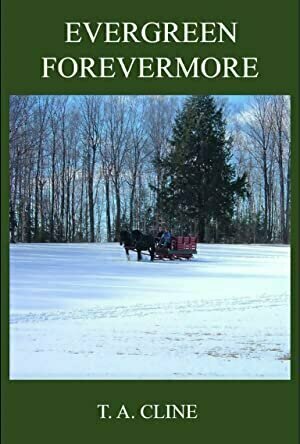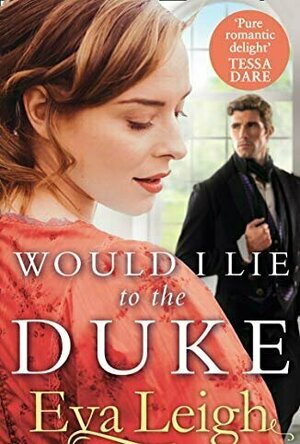Melanie Caldicott (6 KP) rated Sorrowland in Books
Apr 29, 2021
Sorrowland is a genre-bending book which is like nothing I have ever read before and probably ever will again!
The story centres around Fern, an albino black teenage girl who gives birth to twins, Howling and Feral in the woods after escaping from a cult called Cainland. What follows is a mindboggling adventure surrounding her survival.
This is a coming of age story like no other – part sci-fi, part horror, part dystopian, part magical realism, this book defies genre. But amongst all the myriad of twists and turns this novel takes, what lies at the heart of it is a story about a girl who comes to understand her identity and rises above what has been spoken over her in her past.
During Fern’s journey of self-discovery the book examines themes such as racism, indoctrination, abuse and misogyny. There are many challenges in reading this book as we encounter a dystopian world that is disturbingly similar to our own exploring those who live on the fringe of society due to white domination. This not only includes Cainland, the cult set up by black people originally to challenge the white belief system, but also native American characters who quietly hold onto their truth in a far less bigoted and twisted way.
I love the big questions this book asks and the twisted paths it takes in asking them leading you into such unknown territories through the plot that you meet these issues head on in such different ways that you confront them anew and reexamine how you really feel about them and the impact that they have on our world.
Sorrowland is compelling and, although this would never be a genre I would normally read, I enjoyed the enigmatic nature of the evolving fantastical storyline and the constant surprises Rivers Solomon weaves into the plot. It is extremely well-written, with powerful characterisation, rich with poetic descriptions and intelligent themes.
However, the aims of the book seem to get a little muddled at times and I became confused about what Solomon wanted me to get out of the book. The story becomes so fast-paced and dense at times that this prevented me from taking a step back and truly immersing myself in the deeper themes of the novel.
This is a hard book to review. As I said, not something I would normally read, but the quality of the writing won me over. That said, I did not come away from the book feeling a sense of enjoyment, but instead, unsettled and disturbed by encountering a story of brutality with wild, savage characters and a frightening world where nothing is as it seems.
I would recommend this book – purely because you will be changed by it and this is one of the most powerful gifts of literature – but it is not a comfortable read and would not suit everyone.
Thanks to the publishers and NetGalley for the ARe-copy in exchange for this honest review.
Darren (1599 KP) rated The Wound (2017) in Movies
Jun 25, 2019
Xolani gets to see his own secret lover Vija (Mantsai) who is also performing an initiation, but the two men get to return to their forbidden ways. As the initiation continues Kwanda must learn just what this means to the other young men, as Xolani must keep his own secret from everybody else.
Thoughts on The Wound
Characters – Xolani is a factory worker who knows his roots through an initiation process for teenagers to become men, he has returned to be a ‘caregiver’ to his initiate, he gets to rekindle a forbidden love with a married man, which they must keep secret, even if this is the highlight of his life. Vija is a married man who is also a ‘caregiver’, he is much stricter than Xolani and is a lover of his, he knows just how forbidden their love is and will go after anyone who gets in their way. Kwanda is a rich kid that is going through this initiation, he does question the process which puts his position in danger.
Performances – Nakhane Toure is wonderful in the leading role, showing us the commitment to his character has for this love. Bongile Mantsai and Niza Jay in the supporting roles are both brilliant too, which is a completely well acted film throughout.
Story – The story here shows an initiation being performed on teenager boys as they become young men, it takes them away from their family’s and leaves them in the care of a man known as a ‘caregiver’ who helps heal the wound, we have two caregivers that are involved in a gay relationship, which they can only have on these events who have very different lives away from the initiation. This does show us how a culture treats their young men, which shouldn’t be a practised in this modern world. we do get to deal with forbidden romance, in a culture that doesn’t accept homosexual relationships. By having two major world issues going on, it shows us how the country is just as happy to sweep them under the rug, rather than learn to accept them, which is interesting to see,
Romance – The romance side of the story shows the love two men can have, only for a short time, only if nobody else knows, in a culture that isn’t ready to accept them.
Settings – The film is set in a mountain range in South Africa, this location is where the people go every year for the initiation.
Scene of the Movie – Mountain top.
That Moment That Annoyed Me – Its not an easy subject matter when you look at the initiation process.
Final Thoughts – This is a very interesting movie showing us how forbidden love between two men can be in a culture that still practises a form of gender mutilation.
Overall: Culture shock.
https://moviesreview101.com/2019/06/24/abc-film-challenge-world-cinema-x-the-wound-2017/
Kristy H (1252 KP) rated Little Comfort in Books
Oct 14, 2019
This was an intriguing mystery that definitely held my interest. Somehow it was darker and grittier than I expected (sorry, I probably wasn't giving librarians enough credit here), but that certainly didn't diminish my interest at all. The opposite really. Hester is a fascinating character, to say the least. A lot of toughness, smarts, and dedication wrapped into a tiny package (she's 4'9"). She's dealing with a lot, taking on care of three-year-old Kate and a leave of absence, but that doesn't stop her from tracking down subjects and tangling with whomever she meets. She, Kate, and their basset hound, Waffles, are on the case.
The book is told from multiple POV, so we hear from a whole host of characters, including Gabe and Sam. Hill is a wonderful storyteller, and really puts you in the shoes of his characters. And boy, are some of these folks creepy. Terrible things happen in this story, and some of these people are downright despicable. Yet, he still captures the intense longing of Gabe, a foster child, and shows how Hester, who also had a tough childhood, can identify with him. Each character is an individual with their own voice. It's incredibly easy to get caught up in the tale of Gabe, Sam, and Lila and their past at Little Comfort, a lake house, plus Hester, Morgan, and Kate (oh sweet little Kate). I read the second half of the book in one determined setting, fascinated to find out what was going to happen. It's not edge-of-your-seat suspense, per se, but it's wonderful characterization and dark, mesmerizing plotting. So many secrets, so many lies to unravel.
Overall, while this one was more complicated and edgier than I was planning going into it, that was fine with me. Hester is a great character, and I'm really excited that this is a series. Hill is an excellent writer, who knows how to hold my interest with a well-paced thriller. I'm quite looking forward to seeing what Hester is up to next.

Foliobook Photo Portfolio
Photo & Video and Productivity
App
Foliobook is the clean and minimal ipad portfolio app for photographers, agents, designers, models,...

HealthEngine
Health & Fitness and Medical
App
Booking your next health appointment is quick and easy with HealthEngine, Australia’s #1...

QuakeWatch - Latest Earthquakes Info
News and Weather
App
•• The top paid earthquake app for over 8 years. •• A #1 News app in 54 countries so far...
Ivana A. | Diary of Difference (1171 KP) rated Mayhem in Books
Oct 2, 2020
Estelle Laure, the author of This Raging Light and But Then I Came Back believes in love, magic, and the power of facing hard truths. She has a BA in Theatre Arts and an MFA from Vermont College of Fine Arts in Writing for Children and Young Adults, and she lives in Taos, New Mexico, with her family. Her work is translated widely around the world.
It's 1987 and Mayhem Brayburn has always known something's off about her and her mum, Roxy. Roxy is in constant physical pain, and Mayhem has an irresistible pull to water. She knows they aren't like the other people.
When one day, Mayhem's stepfather goes one step too far, her and Roxy escape to Santa Maria, California, the beach town that holds the answers to all of Mayhem's questions about who her mother is. There, she meets the kids who live with her aunt, and she opens the door to the magic that runs through the female lineage of the Brayburn family. The very magic Mayhem is next in line to inherit and which will change her life for good.
But when she is on a mission to search for a man that has been kidnapping girls from the beach, her life takes another dangerous turn and she needs to pay the price of vigilante justice and to ask herself whether revenge is worth the cost.
My Thoughts:
Mayhem by Estelle Laure is one of a kind. Entwined with mystery, magic with family heritage and revenge, this book is full of emotions.
The beginning of the book, although powerful, is very slow. It took me a little while to get into it, but as soon as I was hooked, it stayed amazing.
Mayhem is an interesting character. She holds a lot of emotions inside of her, all from past experiences that have shaped her character. Sad to say that most of her experiences were not good, and she holds the burden for it all. I can imagine how hard it must be to write a character as complicated as Mayhem, and I think Estelle Laure did and amazing job doing it.
I loved the kids as well - each of them different in their own way, battling their own demons and living through their bad experiences in the past. Some of these characters drastically change over the course of the book, which was unbelievable to me.
The magic aspect of this book was interesting, and for me, original. I have seen many reviews mentioning that this might not be true, and it is a very similar story to The Lost Boys. Since I haven't watched The Lost Boys, I am unable to comment on this part. Personally, I really enjoyed the magic concept with the water, the dependency on it and the family heritage part too.
If you are searching for a YA fantasy thriller, with rich characters and mysterious adventures, I think you will definitely enjoy this book.

Leisure Suit Larry: Reloaded
Games
App
It’s not just the funniest game you've ever played… …it’s also the most infamous video game...
Lindsay (1793 KP) rated Evergreen Forevermore in Books
Jun 16, 2024
We are introduced to a judge who is a friend of John's. We meet a young woman named Katherine who needs to learn a few things about people. The story starts in a shelter in New York, where John volunteers and has met some friends along the way.
John and the Judge share a unique bond, a friendship that transcends their professional lives. The Judge, intrigued by John's tales of his hometown, expresses a desire to visit Whitecap. Will this wish be fulfilled? This book, with its rich tapestry of characters, holds the answer.
John sees a man working on the streets and wonders about him. His grandfather tells him his name is Fred Bates. John appears to start a conversation with Fred and introduces him. He also sees Fred Bates's interest in the new medic truck and wonders why. He finds a way to get Fred to work with him at the firehouse.
As the story goes on, there seems to be secrecy and mystery around every door. What are these mysteries, and will John be able to help? The story begins when the Judge has to sentence a woman he meets. Will a change of scenery and learning about others help the young woman? What about her father? There is more to the plot than just learning about expectations and how others feel. The young woman needs an attitude change or will be in much more trouble if she continues her path. Will her father understand that he needs to let his daughter learn the hard lessons and stand on her own to two feet?
Judge James Wilcox, a pivotal character, embarks on a journey with John to uncover long-awaited hidden secrets. Will his efforts lead to a long-overdue family reunion for Katherine and Fred? Will a sweet handyman, be haunted by the memory of his lost and beloved wife, find closure? Fred, a veteran, is finally recognized for his bravery. Will he be able to forgive himself for the past?
This book is heartwarming. I really enjoyed it. I love how this ends. The characters are my favorite. However, each main character's story is involved in the other's. It is more about a story about a town and town folk than just a personal story. TA Cline does a wonderfully good job on this. I recommend this book and these other two books as well. This one is a top favorite. I would like to know if this book can be beaten from the top of the list.
This book is a treasure trove for those who seek a rollercoaster of emotions. This book is a must-read if you are a fan of heartfelt stories, mysteries that keep you on the edge of your seat, and the complexities of family dynamics. It skillfully weaves together a diverse cast of characters, including a veteran, each adding a unique flavor to the narrative.
Ivana A. | Diary of Difference (1171 KP) rated Would I Lie to the Duke (Union of the Rakes, #2) in Books
Oct 5, 2020
<a href="https://diaryofdifference.com/">Blog</a>; | <a href="https://www.facebook.com/diaryofdifference/">Facebook</a>; | <a href="https://twitter.com/DiaryDifference">Twitter</a>; | <a href="https://www.instagram.com/diaryofdifference/">Instagram</a>; | <a
<a href="https://ko-fi.com/diaryofdifference">Ko-fi</a>;
<img src="https://i2.wp.com/diaryofdifference.com/wp-content/uploads/2020/09/Book-Review-Banner-35.png?resize=768%2C432&ssl=1"/>;
Thank you to Mills & Boon, for sending me a copy of Would I Lie to the Duke by Eva Leigh, and for the opportunity to participate on this blog tour.
Would I Lie to the Duke by Eva Leigh is the second book in the Union of the Rakes series. It can be easily read as a standalone though.
<b><i>Synopsis:</i></b>
This is the story of Jessica McGale. Her family business is in need of investors, after it collapses due to a fire. Jessica is determined to acquire investors for her business at any cost. When she realises that London’s elite will never give a chance to a humble farm girl like herself, she does the unthinkable. She poses as “Lady Whitfield” and joins the elite on the table. She especially tries to get close to the Duke of Rotherby, as his influence and support could save her company. But one thing Jess never expected to happen, is to grow feelings for him.
Noel is the carefree and notorious duke, but only his close friends truly know him. When he meets Lady Whitfield at the business bazaar, his world shifts. She makes him want to obey every command she tells, which is something he never imagined doing. He struggles to trust people, but trusting Jess is so easy.
But what happens when the business bazaar is over, and so is the fake portrayal of Lady Whitfield? How do you cope when someone has lied to you, but you want them in your life forever? Read this amazing book to find out!
<b><i>My Thoughts:</i></b>
I was so hooked about this book, and I finished it in two days. While the plot is a bit predictable and it has a Cinderella vibe to it, I still enjoyed it a lot.
I could completely understand where Jess was coming from, and in order to save her business, I don’t think there were any other options, given how much rejection she faced in the first chapters. But as soon as she started developing feelings, she should’ve been honest with Noel. The person in me felt uncomfortable for her every single time she would deliberately put herself in an awkward situation and not tell the truth when she had a chance to. And the business trip to the farm? Oh, that got me biting my nails again. I also understand that continuing with the deception was a crucial part of the plot, to produce the drama that it did, but I am just not a fan of dishonesty.
<b><i>Noel was an amazing character, even though, at times, he seemed like the typical rich boy.</i></b>
I loved the way his relationship with Jess progressed during the couple of days, and how he started opening up. Honestly, I didn’t believe it at first, given that it was based on a lie. I thought that given the fact how much trust issues he had, he could never get past her betrayal. And for me, his way of coping and resolving the issue didn’t fit with his character. I have the feeling that people who are lucky enough to have a high income and live in the elite societies are much more wary of “gold diggers”, and everything Jess does (even though for a good reason), seems to be for her business. So I wouldn’t have blamed him if he reacted in a way more different way and just told her to “bugger off”.
Overall, I enjoyed Would I Lie to the Duke and it was a very pleasurable short read to get me away from reality. I don’t always dive into historical romance, and this was a surprising change that ended on a positive note. Honestly, I am glad that it sparks a debate in my mind and makes me think of “what I would have done” on either side of the relationship. I would have acted very differently. And maybe that’s the reason I’m not married to a duke (yet).
